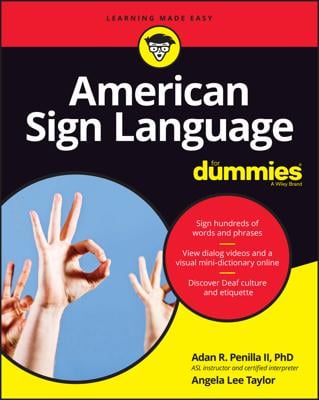American Sign Language (ASL) is the language used by the Deaf community, but you can also sign with your baby, regardless of whether he or she can hear. Signing with babies provides many benefits. Consider these, for example:
Signing gives babies a voice by giving them a way to communicate their wants, needs, and observations. Instead of simply trying to guess what a crying baby needs, for example, a parent or caregiver can understand the need because the baby signs MILK or BALL or FINISHED. Of course, this doesn’t mean the crying stops altogether, but frustration levels are drastically reduced because — through the signs that the baby can make — he or she can communicate some specific wants, needs, and observations.
Signing has long-term benefits. According to research done by Baby Signs, by the time children who signed as babies and toddlers are in second grade, their IQ scores are an average of 12 points higher than the IQ scores of their non-signing peers.
Speech stimulates a particular part of a person’s brain. Children who have chatty, interactive parents typically have more stimulation in the speech center of their brains. That’s pretty cool in and of itself, but now consider this: Children who are exposed to a secondary language have stimulation in an additional part of their brains as they’re exposed to and learn the language.
And here’s a biggie: According to research done by Dr. Marilyn Daniels, children who sign as part of their language development have stimulation in a third, kinesthetic (movement-based sensory experience) portion of their brains.
Signing a word makes that word more concrete to your child. The child is not only hearing the word, but also seeing the sign for the word, seeing the object of the sign, and feeling the movement of the sign. Repeatedly experiencing the sign will eventually lead to a child’s responding to the sign through obvious understanding or by using the sign or word itself.
Some folks worry that signing might delay their babies’ speech. Rest assured, research has repeatedly proven that signing children actually begin to speak earlier and speak more often than their non-signing counterparts.
According to Dr. Michelle Anthony and Dr. Reyna Lindert’s research into signing babies, by 18 months of age, an average Signing Smart child will have 94 signs and 105 spoken words. By stark contrast, a typical non-signing 18-month-old has 10 to 50 spoken words. (Signing Smart is a signing program for hearing babies and toddlers that promotes ASL signs.)

